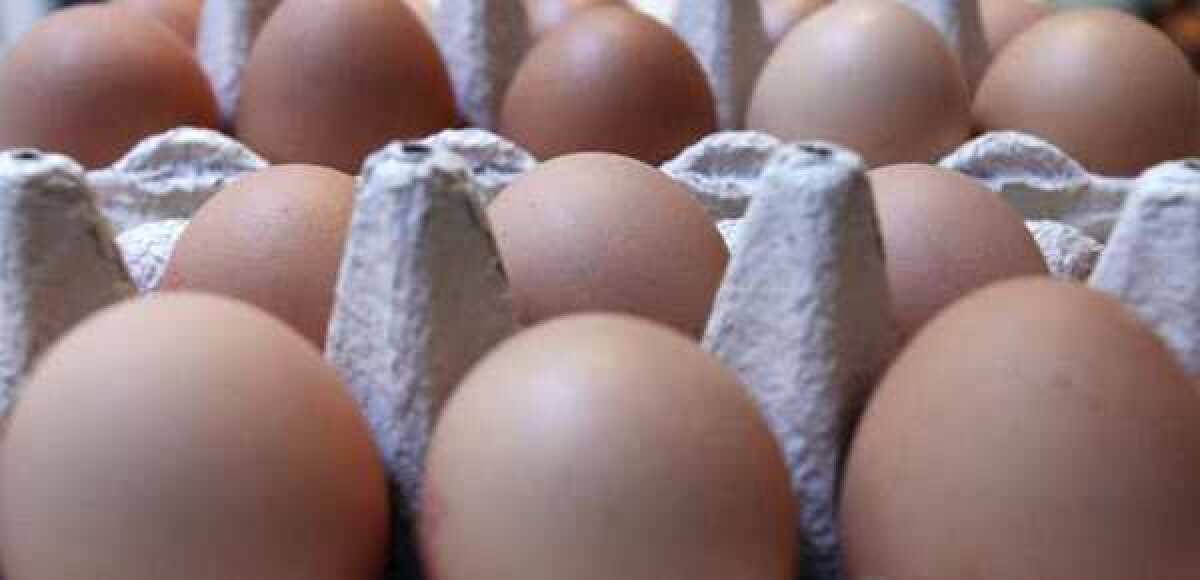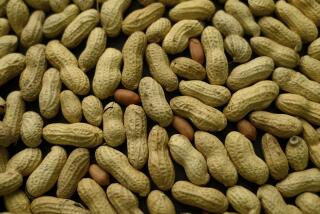Egg allergy cured by eating eggs? (Don’t try this at home.)

- Share via
Kids with egg allergies can often recover, scientists have found – by eating eggs, strange as that may sound.
(Note: The experiment we’re about to describe was done under carefully controlled conditions. Do not try this at home with your child.)
The study, published in the New England Journal of Medicine, was based on the following idea: Maybe the overblown immune reactions behind allergies could be eliminated by feeding patients a little, then a little more, then even more, of the offending food -- until the immune system gets desensitized and doesn’t react to it any more.
A team led by Dr. Wesley Burks of Duke University Medical Center in Durham, N.C., tested the regimen on 55 children ages 5 to 11. All the children had immune reactions to eggs that were severe enough that they seemed unlikely to fade away with time. (Food allergies often go away as kids grow older.) None of the children had allergies that were severe enough to send them into anaphylactic shock.
The children were divided into two groups: one group (40 of them) got egg white powder, the other group (15) got cornstarch, and for the first 10 months, nobody knew who got what.
By the end of the 10 months, children in the “egg” group were ingesting as much as the equivalent of one-third of an egg a day.
At 10 months, the children were fed some egg-white powder in several doses -- and at that point, 14 of the children on the egg therapy group could eat the entire 5 grams without having an allergic reaction and eight others could eat part of the dose before they reacted. None of the children in the cornstarch group passed this test.
At 22 months, the egg group received another egg-powder challenge -- this time with twice as much egg powder, 10 grams. Thirty of the 40 children could now eat it all without reacting to it.
Twenty-nine of those who passed the test then stopped eating any egg powder and were tested again 4 to 6 weeks later -- this was done to see if the improvement would last. Tests were with 10 grams of egg powder and also a whole cooked egg.
Eleven children passed. Those who didn’t pass could still eat more egg than they used to be able to before.
We spoke to Catherine Chavez of Raleigh, N.C., a mother of one of the children who’d been in the trial: Elizabeth, now 15.
Her mom said the family had known since Elizabeth was 9 or 10 months old that she had allergies, triggered by something she was consuming in baby food. She’d get hives, and her eyes would swell up. In the years since then, the family has had to take her to the ER when her airways were affected and she had difficulty breathing.
Elizabeth was allergic to milk, eggs and peanuts. The family heard of the egg trial after she went to see Burks for her condition. Nervously, Elizabeth, then about 11, enrolled.
“She was scared,” Chavez said. “All her life, we’d been saying, ‘Don’t eat eggs! Don’t eat eggs!’ We told her we can just go ahead and try it, and if it’s bad, we’ll stop.”
At first the family was convinced that Elizabeth had ended up in the cornstarch group because she never had allergic reactions. “We would call her ‘Placebo Girl,’” her mom said.
Turns out she was in the egg-powder group -- and was one of the 11 kids who essentially lost the egg allergy. Since then, “she’s been fine,” her mother says. “She eats eggs and has no reaction.”
She’ll have eggs once in a while but isn’t nuts about them. The real plus is all the foods she can eat that have eggs as an ingredient, such as cakes and mayonnaise, her mom says.
Earlier trials of this type, though not as large or rigorously designed, have been done for peanuts and milk as well as eggs. Read about a peanut allergy trial we covered back in 2009.
You can read more about food allergies at the website of the Food Allergy & Anaphylaxis Network.




